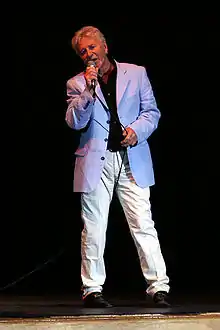Tony Burrows
Anthony Burrows (born 14 April 1942) is an English pop singer and recording artist.[1] He is known for a few minor hits in the 1970s, Top 40 appearances with multiple groups, and extensive work in the recording studio as a session musician.
Tony Burrows | |
|---|---|
 Tony Burrows in concert, 17 May 2008 | |
| Background information | |
| Born | 14 April 1942 Exeter, Devon, England |
| Genres | Pop |
| Occupation(s) | Singer, songwriter |
| Instruments | Vocals, guitar |
| Years active | 1960s–present |
| Associated acts | The Kestrels, The Ivy League, The Flower Pot Men, White Plains, The Pipkins, Edison Lighthouse, The First Class, Brotherhood of Man |
Career
Burrows was born in Exeter, Devon. In the early 1960s, he was a member of The Kestrels, a vocal harmony group which also included the future songwriting team Roger Greenaway and Roger Cook. Subsequently he joined The Ivy League and was still with them when they metamorphosed into The Flower Pot Men. The Flower Pot Men had only one hit, "Let's Go to San Francisco", which reached #4 on the UK Singles Chart in the autumn of 1967. Two founding members of Deep Purple, Jon Lord and Nick Simper, were also part of this early band.
Later, Burrows sang the lead vocals on several other one-hit wonder songs under different group names, Edison Lighthouse's "Love Grows (Where My Rosemary Goes)" (February 1970); White Plains' "My Baby Loves Lovin'" (March 1970); The Pipkins' novelty song "Gimme Dat Ding" (April 1970); and The First Class' "Beach Baby" (July 1974). He also sang lead vocals on The Brotherhood of Man's "United We Stand", which reached #10 on the UK charts and also reached #13 in the U.S.
A published interview with Burrows claims that he became the first (and still the only) recording artist to appear on BBC Television's Top of the Pops fronting three different group acts appearing almost sequentially in a single broadcast show: Edison Lighthouse (the #1 British-charted hit that week), White Plains, and Brotherhood of Man. However records show that this did not happen. He did, however, have two of his bands on the same Top of the Pops four times between 29 January and 26 February 1970. Appearing alongside Edison Lighthouse on the shows were Brotherhood of Man (29-01-70 and 19-02-70) and White Plains (12-02-70 and 26-02-70). The appearances on 29 January, 5 February and 26 February 1970 are all still in existence.
Although he hit the Top 40 as the lead singer of five different groups, he only managed to have one chart single as a solo artist in the U.S. In 1970, he hit the Billboard Hot 100 with "Melanie Makes Me Smile", which peaked at #87. As well as fronting various hit-making acts, Burrows has also contributed vocals as a session singer to many other hits, claiming to have sung on 100 Top 20 hits in the 1970s.[2]
He has also recorded as a session harmony singer with Elton John, Cliff Richard, and James Last. In 2011, Burrows was awarded with BASCA Gold Badge Award in recognition of his contribution to music.[3]
Discography
- Singles
- 1970: "Melanie Makes Me Smile" / "I'll Get Along Somehow Girl (Bell 1103)
- 1970: "I've Still Got My Heart, Jo" / "Every Little Move She Makes" (Bell 1124)
- 1971: "The Humming Song" / "Recollections" (Bell 1140)
- 1971: "I'll Always Come Up Smiling" / "Back Home" (Bell 1172)
- 1971: "Hand Me Down Man" / "Country Boy" (Bell 1190)
- 1971: "In The Bad Bad Old Days" / "In The Bad Bad Old Days" (Bell USA 45-116, promo)
- 1972: "Rhythm of the Rain" / "Home Lovin' Man" (Bell 1235)
- 1973: "Take Away the Feeling" / "Lazy Weekend" (Ammo 103)
- 1974: "Have You Had a Little Happiness Lately" / "Can't Live With You, Can't Live Without You" (Ammo 111)
- 1975: "Run Joey Run" / "Girl I Used To Know" (RAK 216)
- 1976: "Never Gonna Fall in Love Again" / "Changing" (as Magic featuring Tony Burrows) (Bus Stop Records 1036)
- 1976: "Oh My Jo" / "Girl You've Got Me Going" (Bus Stop 1039)
- 1976: "When My Little Girl is Smiling" / "What Ya Gonna Do About Him" (DJM 10718)
- 1984: "Three Chord Trick" / "Wake Up America" (as Heart to Heart with Stephanie de Sykes) (EMI 5461)
References
- Jancik, Wayne (March 1998). The Billboard book of one-hit wonders. Billboard Books. p. 275. ISBN 978-0-8230-7622-2. Retrieved 29 May 2011.
- "Tony Burrows". Alwynwturner.com. Retrieved 8 September 2018.
- "Gold Badge Awards in pictures - M Magazine". M-magazine.co.uk. 26 October 2011. Retrieved 8 September 2018.
External links
- Tony Burrows interview
- 45cat discography
- Tony Burrows discography at Discogs
